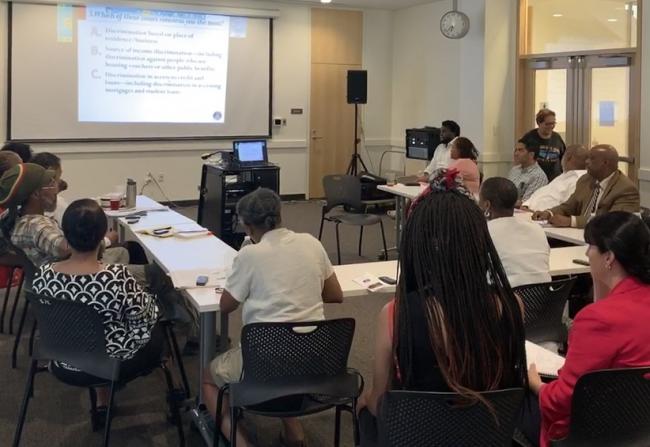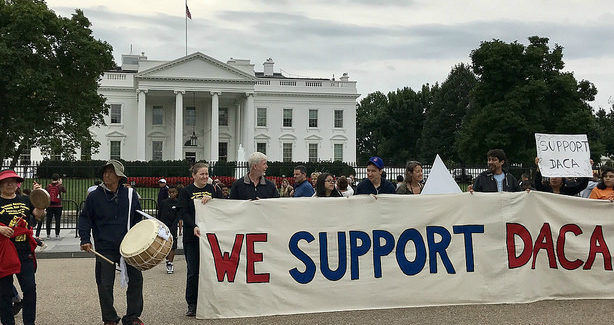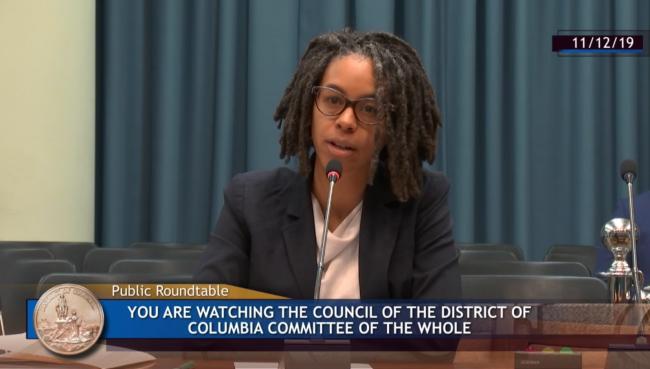Newsletter: Holding Slumlords Accountable
Click here to sign up for OAG's newsletter.
At the Office of the Attorney General (OAG) we are using the law to protect tenants, hold abusive landlords accountable, and preserve existing affordable housing.
This week, I was pleased to announce a settlement that will require notorious landlord Sanford Capital to return $1.1 million to 155 tenants in Wards 5, 7, and 8 who were forced to live in squalor. For years, Sanford charged tenants rent but failed to maintain the property, forcing tenants to live in uninhabitable conditions with vermin infestations, inconsistent heat, broken plumbing, and dangerous fire code violations. Sanford is also required to pay a penalty to the District and, in accordance with a previous settlement, it must continue to divest ownership in all properties in the District and not work in the city’s residential housing business for at least seven years. The company once managed more than 20 properties in the District, and it is now winding down its last two properties.
This settlement is OAG’s largest-ever rent recovery from a District landlord, providing long-overdue relief to vulnerable residents forced to live under inhumane conditions. I am thankful to our tireless partners at Legal Aid Society of the District of Columbia, the Washington Legal Clinic for the Homeless, Housing Counseling Services, and Arnold & Porter for their hard work on this case.
This settlement sends a message to slumlords that business practices that put profit ahead of the safety and wellbeing of their tenants will not be tolerated in the District. This resolution is just the latest effort in OAG’s fight to preserve and protect affordable housing. We have won court orders forcing building owners to fix health and safety issues at properties across the District and secured hundreds of thousands of dollars in restitution for residents who were forced to live in unsafe conditions. OAG has also sued landlords who refused to take basic security measures to keep tenants safe, stopped landlords who illegally converted rent-controlled apartments into short-term rentals, and took action against landlords who discriminated against District residents who use housing vouchers.
You can learn more about tenants' rights in the District by browsing our free resources and read about OAG’s newest efforts to fight all forms of discrimination in our civil rights brochure.

Karl A. Racine
Attorney General
Supporting Crime Victims
Last week, OAG was honored to receive the Network for Victim Recovery of DC’s (NVRDC) “Community Advocacy Award,” which recognizes local partners who work closely with the community to help and support those impacted by crime. From our Special Victims Unit and Elder Justice Section to efforts to protect immigrants, workers, and consumers, OAG starts with a victim-centric perspective. OAG is constantly asking: Who is being targeted? Who is at risk? How can the law be used to help heal and make them whole? AG Racine looks forward to continuing to work with NVRDC and other local advocates to elevate and support the needs of those impacted by crime in the District.
Combatting Discrimination and Bias-Motivated Violence
At OAG's civil rights listening sessions this summer, community members described a painful truth—many District residents still face harmful discrimination and even violence because of who they are, who they love, or where they are from. OAG recently released a report that elevates these passionate and personal stories and how they are informing the office’s civil rights work. AG Racine recently introduced legislation to help combat hate crimes in D.C. and has filed several lawsuits to stop unlawful housing discrimination in the District. If you experience discrimination of any kind, report it to OAG by emailing OAGCivilRights@dc.gov or calling (202) 727-3400. You can also submit a complaint with the D.C. Office of Human Rights by filling out an online form or calling 202-727-4559.
Defending Dreamers at the Supreme Court
In 2017, AG Racine joined a group of 16 Attorneys General in suing to stop the Trump administration from terminating the Deferred Action for Childhood Arrivals (DACA) program, which allows young, undocumented immigrants—also known as Dreamers—to live, study, and work in the U.S. without fear of deportation. These hardworking young people followed the law and applied for DACA, and then the Trump administration attempted to end the policy and threw their lives into chaos. This week, the coalition was at the Supreme Court to continue fighting the Trump Admin’s baseless decision to end this critical policy. For the latest updates on this case, follow AG Racine on Twitter, Facebook, and Instagram.
Safeguarding Consumer Data
Recently, consumers have seen the largest and most serious data breaches in history, including the Equifax breach, which exposed the personal information of over 143 million people nationwide and nearly 350,000 District residents. To better protect consumers, AG Racine introduced the “Security Breach Protection Amendment Act” earlier this year and the D.C. Council held a hearing on the legislation this past week. This bill would require companies to protect a broader range of private information, maintain reasonable security procedures, and inform consumers and the Attorney General of a data breach. You can learn how to protect your sensitive and private information by visiting OAG’s Consumer Protection Library. You can report data theft, scams, and unlawful or abusive business practices to OAG by calling 202-442-9828 or submitting a complaint online.
Resolving Workplace Disputes Quickly and Fairly
Employees are entitled to a fair process to vindicate their workplace rights, including when they are required to do so through arbitration. This week, AG Racine led a 12-state coalition to ensure workers can resolve employment disputes fairly and quickly in arbitration. AG Racine is concerned about reports that workers in the District have encountered high costs and prolonged delays in arbitration that have prevented them from reaching resolutions. That’s why he has requested data from the leading arbitration firms to better understand how we can protect workers and ensure they have a fair shot at resolving disputes. Learn more.
Expanding Veteran Treatment Courts
Earlier this week we celebrated Veterans Day, recognizing the 30,000 brave veterans in the District—and others across the country—who have defended our nation and our freedoms. To further support our veterans, AG Racine joined a bipartisan group of 44 Attorneys General this week in urging the Senate to pass the Veteran Treatment Court Coordination Act. These treatment courts help rehabilitate veterans who commit minor, non-violent offenses by pairing them with mentors to address substance abuse and mental health issues. These courts also assist veterans with obtaining U.S. Veterans Administration benefits that can help them with treatment and employment.





